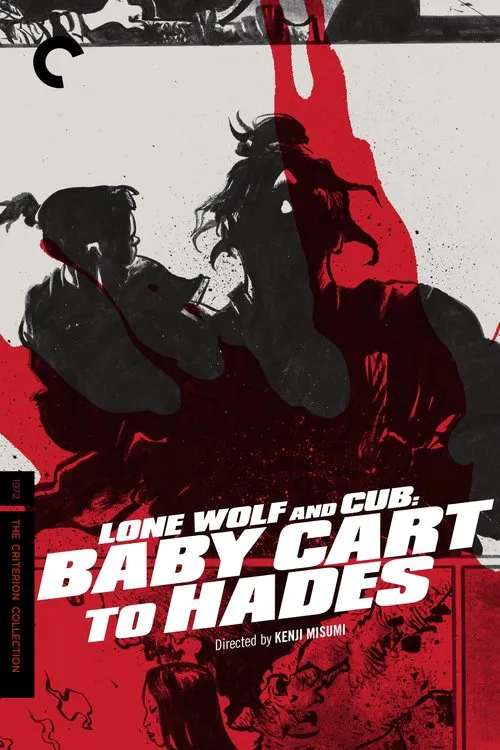Lone Wolf and Cub: Baby Cart to Hades

Plot
Lone Wolf and Cub: Baby Cart to Hades is a Japanese martial arts film released in 1973, directed by Kenji Misumi and starring Tomisaburo Wakayama as Ogami Itto. It is the third installment in the popular Lone Wolf and Cub series, a cinematic adaptation of the manga by Kazuo Koike and Goseki Kojima. The film begins with Ogami Itto, a rogue samurai, and his young son, Daigoro, on a journey to fulfill their revenge against the Yagyu clan, who are responsible for the death of Itto's wife. During their travels, they arrive in a rural village, where they come across a beautiful prostitute named Sato, who is being brutalized by a group of ruthless men. Itto intervenes, and in a brief fight, he single-handedly dispatches the attackers. However, the village elders, who are under the protection of the yakuza, are reluctant to involve themselves in the situation. One of the village elders, sensing Itto's power and reputation, approaches him and requests that he help them rid the village of a corrupt yakuza leader named Kikazuku. In exchange, they will grant Itto and his son sanctuary and protection. However, there is a condition: Itto must volunteer to be tortured in a sadistic ritual called "Tengu no Tsuka", which involves being impaled on a row of sharp spikes. Ogami agrees to the terms and, along with his son, is led to a hidden temple where the torture ritual will take place. However, unbeknownst to Itto, the ritual is merely a ruse, designed to test his courage and resolve. Kikazuku, the yakuza leader, has secretly ordered his men to torture Itto to near-death, with the intention of crushing his spirit and turning him into a mercenary. As Itto is subjected to the gruesome torture, he discovers that one of the villagers, a wise old man named Ichi, is secretly a yakuza assassin, tasked with killing Itto during the ritual. Itto, however, uses his extraordinary endurance and fighting skills to overcome the torture and, in a brief fight, dispatches the assassin. As the villagers and Itto's son watch in awe, it becomes clear that Itto is not broken by the torture but, rather, has emerged stronger and even more fierce. Kikazuku, impressed by Itto's resilience, reveals his true intention: he has been hired by the corrupt Tokugawa Shogunate official, Lord Matsudaira, to eliminate an evil chamberlain named Matsudaira Naritsugu. Naritsugu is a ruthless and sadistic man, responsible for numerous atrocities committed during the Tokugawa era. He is known for his cruelty, particularly towards women, and has been appointed by the Shogun as the Chamberlain of Kyoto. Naritsugu's crimes are numerous, and his brutal behavior towards women has earned him the hatred of many samurai and ordinary people. Kikazuku, in conjunction with Matsudaira Naritsugu, has orchestrated a trap to eliminate Itto and utilize his services to eliminate Naritsugu, thereby ensuring their own interests are secured. As Itto learns about Naritsugu's atrocities, he realizes that their goals align, and he agrees to eliminate the chamberlain, with the intention of taking him down himself. Throughout the film, Itto's relationships with the other characters are multifaceted and nuanced. He has a deep affection for Sato, who is initially reluctant to involve herself in Itto's quest. However, she eventually warms up to him, and their interaction is tender and poignant. With Ichi, the village elder turned yakuza assassin, Itto has a complex dynamic, one that balances a deep sense of respect and admiration with a cold assessment of their motivations. The film's climax features a memorable and visceral showdown between Itto and Naritsugu, which leaves few survivors. In the end, it is a tale of vengeance, honor, and revenge against the system, and the struggle of an individual, driven by their code of conduct, who refuses to be compromised by corruption. Lone Wolf and Cub: Baby Cart to Hades delivers on the expectations built by its predecessors, showcasing breathtaking martial arts, beautiful landscapes, and a powerful narrative. Its gripping and suspenseful storyline, coupled with Tomisaburo Wakayama's iconic performance as Ogami Itto, have made it a staple in the genre of martial arts and Japanese cinema.
Reviews




